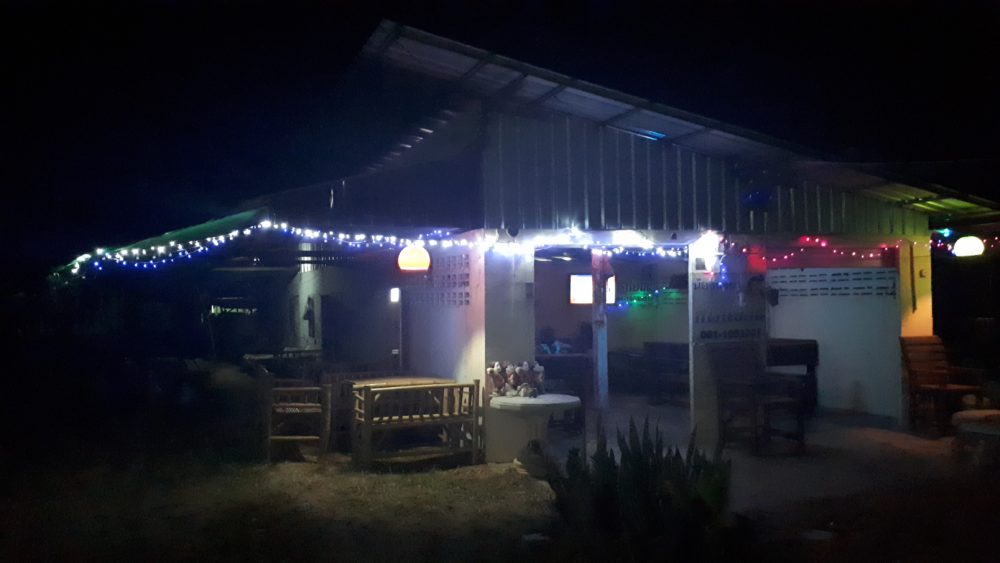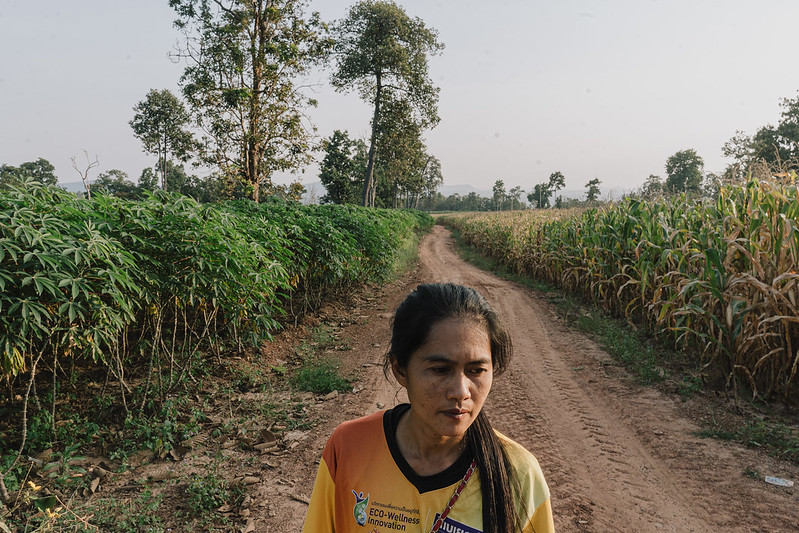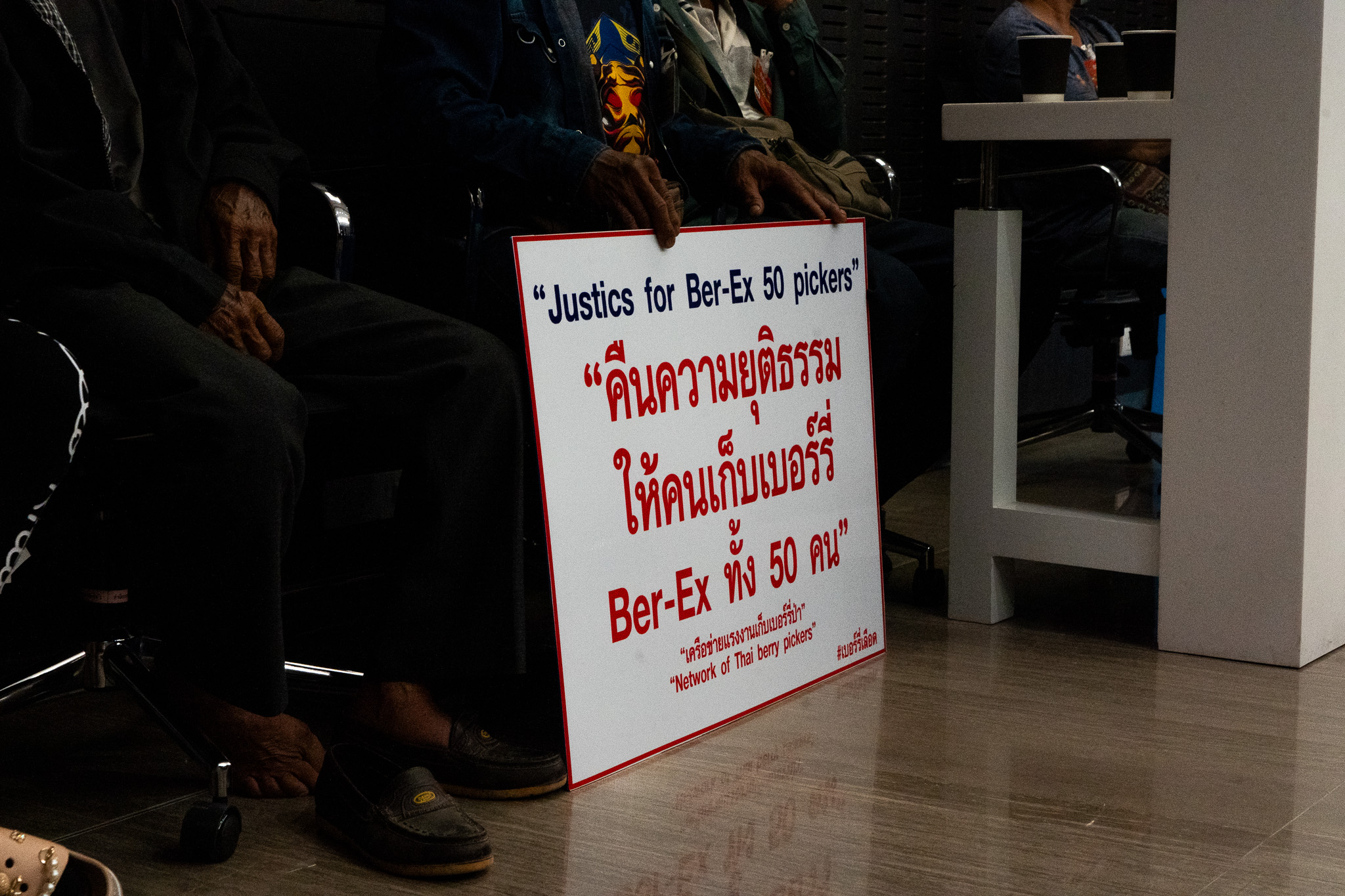At a roadside wood and corrugated iron shack bathed in green fluorescent lighting, Praew points to the bamboo furniture. “It’s cooler out here with the breeze, and it’s not as loud as in there,” she explains, nodding at the house set back from the shack, which contains the kitchen, restrooms, and a blaring karaoke machine.
The sultry night air carries the scent of tropical vegetation, sun-baked earth and the faint smell of something being fried with garlic. As food and beer begins to flow from inside, Praew starts to talk about being a Lao sex worker in Det Udom, a sleepy rural town in Ubon Ratchathani province.
Four years after a nationwide spate of raids and sting operations, it is business as usual in the brothels and karaoke bars along the Thai-Lao border. Lao women from poor families continue to find ways to enter the sex trade in Thailand, despite the risk of arrest and deportation.
Meanwhile, public health authorities are frustrated by the Lao sex workers’ mistrust of Thai officials, which hobbles efforts to curb the spread of diseases.

Some Lao sex workers prefer to work in rural karaoke bars rather than in larger city brothels because of the perceived lower risk of strict law enforcement.
Just a hop across the border
Praew comes from a rural village with, in her words, “nothing at all” near Phonthong, about 20 kilometers from the Thai-Lao border crossing of Chong Mek. Now 29, she came to Thailand in her early 20’s in search of work to support her family and to escape from village life. Friends had told her she could make good money across the border, much more than local jobs in the nearby Lao city of Pakse pay.
According to the International Labour Organization, Thailand is the foremost destination for Lao migrant workers. Thailand’s Ministry of Labour recorded about 111,000 Lao migrants legally permitted to work in Thailand as of May 2018. The migration is driven by a lack of career options and poverty for the country’s largely unskilled workforce. The average monthly wage in Thailand is more than double the average wage of 900,000 kip (3,500 baht, USD 110) in Laos.
Praew and her coworkers at the karaoke bar are not salaried, but receive about 5 to 15 baht commission for each soft drink they sell. They make about 10,000 baht (USD 315) a month with the lion’s share coming from providing sexual services to customers of all stripes, mostly locals.
“In Pakse, I would probably be making less than half that, and I’d be working full time,” says Tukta, a 26-year-old colleague of Praew.
Praew and Tukta maintain that their income is sufficient to send remittances to their families in Laos “without having to work too hard”.
“I may not receive a salary, but I’m also free to come to work whenever I want,” says Praew. “If I want to sleep in that day, I do. If I feel like going home to visit my parents for a few days, or to attend a celebration back home in Laos, I just tell the owner in advance and off I go.”
The World Bank estimates that in 2016, Laos received a total of over four billion baht (USD 116 million) in remittances from Lao migrant workers in Thailand.
Across the Northeast, Lao women find employment in brothels and karaoke bars concentrated in the borders areas. But hard data on the numbers of Lao sex workers in Thailand is hard to come by. According to a 2015 study commissioned by the Ubon Ratchathani Provincial Health Service, there were 2,410 women working in restaurants and karaoke bars in Ubon Ratchathani province alone. Of these, 1,230 of them were confirmed sex workers, with just over half of them (692) coming from Laos.

Colored lights on a building late at night are a sign that karaoke and female company may be available on the premises.
A crackdown for show
Spurred by international criticism, after human trafficking was found to exist in Thailand on a large scale, the country’s military government launched a crackdown in 2015, and raided brothels, massage parlours, and karaoke bars. The operation yielded mixed results.
While efforts were made to encourage law enforcement officers to be more mindful of victim protection–mainly through the creation of an anti-trafficking task force composed of law enforcement, social workers, and NGOs–official complicity continues to frustrate anti-trafficking efforts.
According to a US State Department report, officials are still arresting, punishing, and deporting victims of trafficking for crimes committed as a direct result of the trafficking, such as commercial sex work. Certain parties, such as employers, have also used Thailand’s tough libel laws to deter victims, activists, and officials from taking action or pursuing investigations for fear of having criminal defamation charges brought against them. In 2013 the Royal Thai Navy sued two journalists for defamation after they quoted a Reuters report which implicated the navy in the commercial trafficking of Rohingya refugees.
Underage sex workers from neighboring countries may have all but disappeared as a result of this crackdown, but adult Lao women continue to enter Thailand legally to work in the sex trade under the guise of waitresses, shop assistants, or other types of menial laborers.
To facilitate the visa and work permit application process for the mostly poorly educated Lao women, fixers charge a fee of up to 20,000 baht, which is sometimes subsidized or paid for in full by the karaoke establishments.
When the migrants are caught performing work that differs from the jobs stated in their work permits, they are fined 2,000 baht, sometimes jailed for a few days while their deportation orders are processed, and then sent back to Laos.
“It’s like going on an unplanned holiday back home,” Praew says. “We just move our house registration to a relative or friend’s house before we can apply to come back to Thailand again. It’s not that hard to do; I don’t think the Thai authorities really care.”
Praew–along with several compatriots working in the same establishment that night–admit that between them they’d been deported from Thailand about a dozen times over the years.
Speaking on condition of anonymity, a police sergeant in the Crime Suppression Department of Police Region 4 said that the 2015 crackdown did little to address Thailand’s human trafficking problem.
“From what I saw, the human-trafficking crackdown was mostly for show. They went for the emotional targets like the massive city brothels or rural karaoke bars for the TV and newspapers, but what about all the slave-labor being trafficked for the fishing fleets?”
He went on to say that specialist vice units typically raid venues based on orders from above, and that these raids belie the fact that local police tend to “already have a working relationship” with brothels and karaoke bars. Local authorities are most likely to be fully aware that the venue hosts sex workers, and sometimes receive protection money from the owner.

While some karaoke bars have basic living quarters for staff, this one eschews them as a legal precaution. If the Lao sex workers are found staying there, the owner of the premises may be charged with providing refuge to illegal aliens.
Enforcing broken laws
Experts say that the laws governing sex work in Thailand often do more harm than good. The law most often cited against sex workers by the authorities is the 1996 Prevention and Suppression of Prostitution Act. It defines prostitution as “sexual intercourse, or any other act, or the commission of any other act in order to gratify the sexual desire of another person in a promiscuous manner in return for money or any other benefit.”
Naiyana Supapung, a lawyer, female rights activist and former national human rights commissioner, argues that these laws create loopholes for corruption and protection rackets. When establishments pay protection money, police and officials fail to perform their duties properly. When they fail to perform their duties properly, they allow human trafficking to occur.
Thanta Laowilawanyakul, a sex work legalization activist at the Empower Foundation and former sex worker, is highly critical of not just the laws surrounding sex work in Thailand, but also of law enforcement itself.
“Law enforcement officers cause the most problems for sex workers, not bad customers or sexually transmitted diseases,” she argues.
In 2011, the Supreme Court ruled that it is lawful for undercover police to use the ultimate form of entrapment against sex workers: soliciting sex from the sex workers, pay for sexual services rendered using public money, and then arrest the sex workers for committing the crime of prostitution afterwards.
“The moment that a sex worker admits to a police officer that she is indeed a sex worker, she is liable to a 1,000 baht fine and a criminal record,” Naiyana says. “It is sad that as vulnerable as they already are, they feel persecuted by the law when they might be needing the law the most.”
Echoing Naiyana’s sentiments, Thanta argues that sex workers are already in a vulnerable position because of the nature of their jobs.
“Now imagine how vulnerable the sex workers feel when they think that can’t even go to the police when, say, a colleague is raped, or when they discover that they are working with trafficked minors,” she says.
Thanta argues that “the law amounts to institutionalized violence against sex workers” because it directly results in them being entrapped by predatory police officers, fined, imprisoned, and in some cases, deported.
“No other service industry workers face such occupational hazards,” says Thanta, who believes that sex work should be recognised as a legitimate service industry profession in the eyes of the law.
No data on public health
Because of the mistrust of Thai government officials, Lao sex workers tend to avoid any contact with public health workers. This not only hinders their access to health services but also hampers the ability of officials in the border regions to effectively respond to the spread of diseases.
In 2018, Ratchaneewan Niramit, a researcher at Khon Kaen University who conducted a study on the access to healthcare among Lao sex workers in Ubon Ratchathani province, found that the criminalization of sex work prevents public health officials from keeping detailed and accurate records on sex workers.
“The same goes for their counterparts in the local administration authorities and the local police,” Ratchaneewan says. “The law of relationships is what keeps things ticking along in the border areas, and the last thing anyone wants is to attract attention and trigger another face-saving crackdown.”
However, she also found that local authorities, police, and public health workers in the border areas have tacitly agreed to assist and treat Lao sex workers on a case-by-case basis without looking too closely at their legal status or professional activities.
Yet, a public health worker interviewed in the study regards Lao sex workers as one of the hardest groups to work with in terms of healthcare provision. The local public health authorities provide free annual health checks for sex workers, but the Lao women in the area tend to avoid making use of the service.
Ratchaneewan’s qualitative research found that a majority of sex workers did not become well aware of disease risks and the need for protection until they entered the sex trade, and that their traditional culture plays a profound role in how they deal with customers.
“Where I come from we believe in spirits. If we break the rules [set by the spirits], such as having children out of wedlock, there will be consequences. I or members of my family could become seriously ill, with no way to treat the illness other than to appease the spirits” Tu, a Lao sex worker in Ubon Ratchathani, told Ratchaneewan. “I tell my customers that if they don’t want to use a condom they have to go and ask my parents in Laos for my hand in marriage.”
According to Ratchaneewan’s findings, sex workers in the more remote areas have no choice but to go to public hospitals and clinics where they pay the full amount for treatment, but private healthcare providers are often still preferred for their perceived discretion and efficiency.

“Low season” for the Lao sex workers of rural Thailand coincides with crop planting periods. “High season” comes after the harvest has been sold and customers have money to spend.
A way forward
These sex workers and legal experts seem to concur that Thailand’s laws and law enforcement agencies have some catching up to do when it comes to delivering justice to those involved in sex work.
Naiyana recognizes how laws concerning sex workers can pull two ways. “Lawmaking for sex work is fraught with tension between those who see the laws as a tool for social justice and those who want to use them as a tool for moralizing.”
Thanta regards repealing the Prevention and Suppression of Prostitution Act of 1996 to be the single most important thing that can be done at this point. The law, she says, “creates a barrier that prevents sex workers from accessing their rights, such as the the right to health, the right to a livelihood, and various other rights.”
At the same time, Thanta believes that sex workers can become whistleblowers in the fight against human trafficking and child prostitution.
“Your average sex worker is very much against seeing children in the sex trade, but cannot say anything because of their own illegal status,” Thanta says. “If sex work was legal, the very first people to go to the authorities about human trafficking would be the sex workers themselves.”
Changes to the laws affecting sex work were being pursued under the administration of Prime Minister Yingluck Shinawatra, which commissioned a legal task force, including Naiyana, to examine the law and make actionable recommendations. Among the recommendations floated at the time was the registration and regulation of sex workers. After the 2014 coup, the junta abruptly cancelled the project and disbanded the committee.
Naiyana Supapung has hopes that a positive change in government may revive this effort, and ultimately lead to positive changes for sex workers all over Thailand, wherever they may come from.
For Praew, who would like to end her career as a sex worker, the prospect of becoming a legal sex worker comes a little too late to make a difference.
She coyly confesses that a regular client has recently bought her a new fridge. “Maybe his next gift will be a ring!” she wonders out loud, hinting at a common exit strategy for Lao sex workers as her coworkers cheer.
“Still though, it would be nice if we didn’t have to pretend,” she says. “The men in Det Udom certainly don’t pretend that we’re waitresses come harvest time.”




